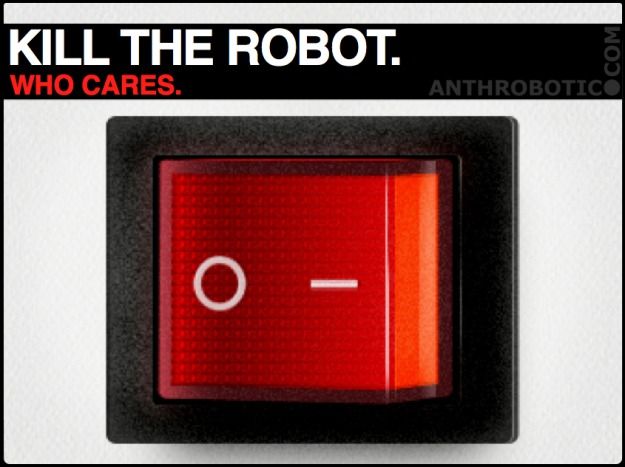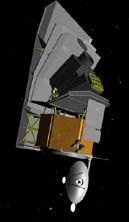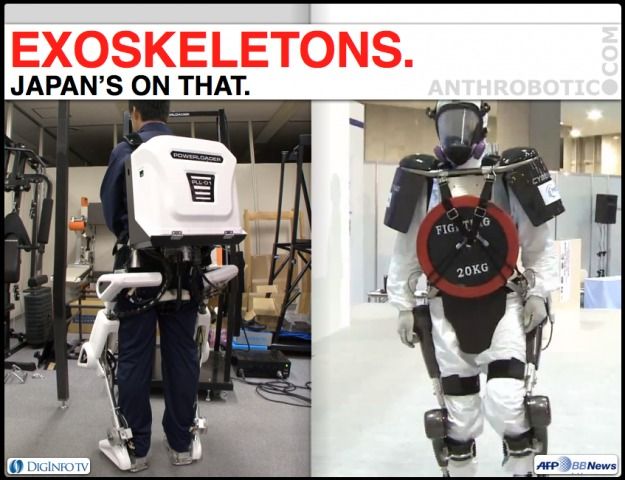http://news.yahoo.com/meteor-explodes-over-russia-1-100-…38744.html
I have been hoping for exactly this event; now we will see if we are actually an intelligent species and protect the planet from impacts.
http://news.yahoo.com/meteor-explodes-over-russia-1-100-…38744.html
I have been hoping for exactly this event; now we will see if we are actually an intelligent species and protect the planet from impacts.

The Golden Rule is Not for Toasters
Simplistically nutshelled, talking about machine morality is picking apart whether or not we’ll someday have to be nice to machines or demand that they be nice to us.
Well, it’s always a good time to address human & machine morality vis-à-vis both the engineering and philosophical issues intrinsic to the qualification and validation of non-biological intelligence and/or consciousness that, if manifested, would wholly justify consideration thereof.
Uhh… yep!
But, whether at run-on sentence dorkville or any other tech forum, right from the jump one should know that a single voice rapping about machine morality is bound to get hung up in and blinded by its own perspective, e.g., splitting hairs to decide who or what deserves moral treatment (if a definition of that can even be nailed down), or perhaps yet another justification for the standard intellectual cul de sac:
“Why bother, it’s never going to happen.“
That’s tired and lame.
Continue reading “Machine Morality: a Survey of Thought and a Hint of Harbinger” »
It appears now that intelligence of humans is largely superseeded by robots and artificial singularity agents. Education and technology have no chances to make us far more intelligent. The question is now what is our place in this new world where we are not the topmost intelligent kind of species.
Even if we develop new scientific and technological approaches, it is likely that machines will be far more efficient than us if these approaches are based on rationality.
IMO, in the next future, we will only be able to compete in irrational domains but I am not that sure that irrational domains cannot be also handled by machines.
“Olemach-Theorem”: Angular-momentum Conservation implies a gravitational-redshift proportional Change of Length, Mass and Charge
Otto E. Rossler
Faculty of Natural Sciences, University of Tubingen, Auf der Morgenstelle 8, 72076 Tubingen, Germany
Abstract
For those in Colorado who are interested in attending a talk by John Troeltzsch, Sentinel Ball Program Manager, Ball Aerospace & Technologies Corp. please R.S.V.P Chris Zeller ([email protected]) by Tuesday, 26 February 2013 for badge access. US citizenship required.
6:00 pm Thursday, February 28th 2013
6:00 pm Social, 6:30 pm Program
Ball Aerospace Boulder Campus RA7 Conference Room
1600 Commerce St
Boulder, CO 80301
It will be good to see you there.
About the Talk:
 The inner solar system is populated with a half million asteroids larger than the one that struck Tunguska and yet we’ve identified and mapped only about one percent of these asteroids to date.
The inner solar system is populated with a half million asteroids larger than the one that struck Tunguska and yet we’ve identified and mapped only about one percent of these asteroids to date.
Tags: AIAA, Asteroid Impacts, B612 Foundation, Ball Aerospace & Technologies Corp., Chris Zeller, Clark Chapman, Ed Lu, John Troeltzsch, Kepler Space Telescope, Near Earth Objects, NEO, Piet Hut, Rocky Mountain AIAA, Rusty Schweickart, Sentinel Infrared (IR) Space Telescope, Sentinel Program, Spitzer Space Telescope, Tunguska, University of Colorado

LEFT: Activelink Power Loader Light — RIGHT: The Latest HAL Suit
New Japanese Exoskeleton Pushing into HAL’s (potential) Marketshare
We of the robot/technology nerd demo are well aware of the non-ironically, ironically named HAL (Hybrid Assistive Limb) exoskeletal suit developed by Professor Yoshiyuki Sankai’s also totally not meta-ironically named Cyberdyne, Inc. Since its 2004 founding in Tsukuba City, just north of the Tokyo metro area, Cyberdyne has developed and iteratively refined the force-amplifying exoskeletal suit, and through the HAL FIT venture, they’ve also created a legs-only force resistance rehabilitation & training platform.
Joining HAL and a few similar projects here in Japan (notably Toyota’s & Honda’s) is Kansai based & Panasonic-owned Activelink’s new Power Loader Light (PLL). Activelink has developed various human force amplification systems since 2003, and this latest version of the Loader looks a lot less like its big brother the walking forklift, and a lot more like the bottom half & power pack of a HAL suit. Activelink intends to connect an upper body unit, and if successful, will become HAL’s only real competition here in Japan.
And for what?
Well, along with general human force amplification and/or rehab, this:
A Revolution in Physics and Cosmology
by Otto E. Rossler, Faculty of Natural Sciences, University of Tubingen, Germany
A deterministic 2-particle system interacting with a fixed third particle (the wall of a confining T-tube) shows two kinds of behavior never seen in a deterministic system before: Dissipative and antididissipative behavior in both directions of time (dependent on the sign of the force law). Dissipative behavior occurs in both directions of time when the system is started from non-selected far-from-equipartition initial conditions while the potential (giving rise to the force law) is Newtonian–repulsive. Antidissipative behavior occurs (in both directions of time) when the system is started from non-selected far-from-equipartition initial conditions while the potential is Newtonian–attractive.
“Entropic” behavior had not been demonstrated before in a deterministic system. Now, both “entropic” and “ectropic” behavior are described under deterministic-chaos conditions. The numerical simulations are due to Klaus Sonnleitner (2010) and, independently, Ramis Movassagh (2011) who also provided an analytical derivation.
I was recently accused on another blog of repeating a defeatist mantra.
My “mantra” has always been WE CAN GO NOW. The solutions are crystal clear to anyone who takes a survey of the available technology. What blinds people is their unwillingness to accept the cost of making it happen.
There is no cheap.
Paul Gilster comments on his blog Centauri Dreams, concerning Radiation, Alzheimer’s Disease and Fermi;
“Neurological damage from human missions to deep space — and the study goes no further than the relatively close Mars — would obviously affect our planning and create serious payload constraints given the need for what might have to be massive shielding.”
If, we as a community, are intending to accelerate the development of interstellar travel we have to glower at the record and ask ourselves some tough questions. First, what is the current record of the primary players? Second, why is everyone afraid to try something outside the status quo theories?
At the present time the primary players are associated with the DARPA funded 100-Year Starship Study, as Icarus Interstellar who is cross linked with The Tau Zero Foundation and Centauri Dreams is a team member of the 100YSS. I was surprised to find Jean-Luc Cambier on Tau Zero.
Gary Church recently put the final nail in the Icarus Interstellar‘s dreams to build a rocket ship for interstellar travel. In his post on Lifeboat, Cosmic Ray Gorilla Gary Church says “it is likely such a shield will massive over a thousand tons”. Was he suggesting that the new cost of an interstellar rocket ship is not 3.4x World GDP but 34x or 340x World GDP? Oops!
Let us look at the record. Richard Obousy of Icarus Interstellar and Eric Davis of Institute for Advanced Studies claimed that it was possible, using string theories to travel at not just c, the velocity of light but at 1E32c, or c multiplied by a 1 followed by 32 zeros. However, Lorentz-FitzGerald transformations show that anything with mass cannot travel faster than the velocity of light. Note that Lorentz-FitzGerald is an empirical observation which was incorporated into Einstein’s Special Theory of Relativity.
Continue reading “Gravity Modification – What Is The Record?” »
Tags: 100 year Starship Study, 100YSS, 1E32c, Centauri Dreams, Cosmic Ray Gorilla, DARPA, Einstein, Eric Davis, Gary Church, George Hathaway, Icarus Interstellar, Institute for Advanced Studies, Interstellar Travel, Jean-Luc Cambier, lifeboat, Lorentz-Fitzgerald, Mae Jemison, Mathematical Conjecture, Michio Kaku, Podkletnov, Richard Obousy, Sincerest Condolences, Special Theory of Relativity, The Space Show, The Tau Zero Foundation
